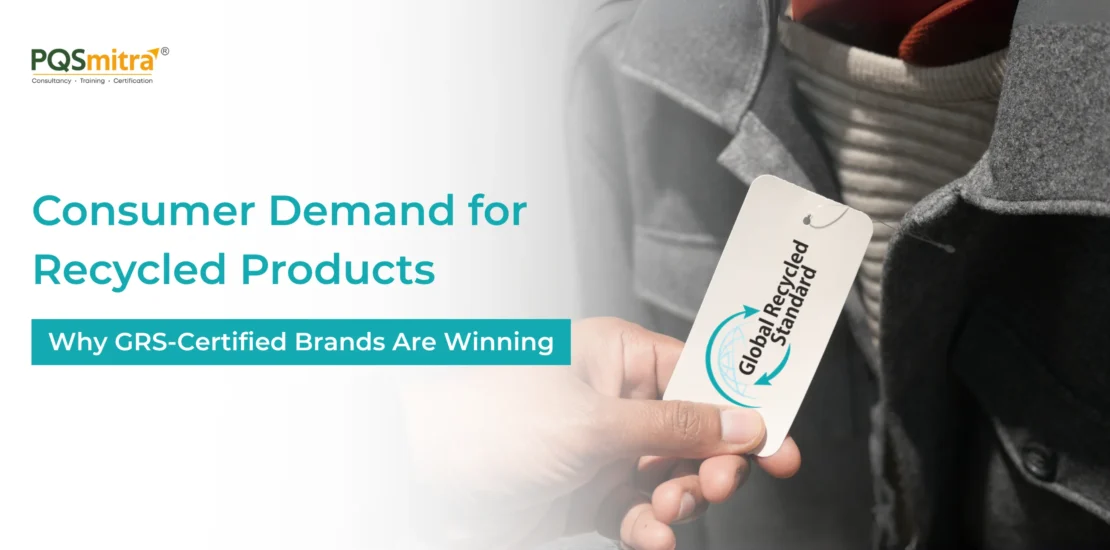Consumer Demand for Recycled Products: Why GRS-Certified Brands Are Winning
- May 19, 2025
- Posted by: PQS_Mitra_Main_Access
- Categories: Environmental Social and Governance (ESG), Global Recycled Standard (GRS)

Look around, and you’ll notice a change—people are becoming more conscious of what they buy. Whether it’s clothing, packaging, or home essentials, customers are actively searching for products made from recycled materials. But there’s a catch—how can they trust a brand’s sustainability claims? That’s where GRS (Global Recycled Standard) certification steps in.
Brands that embrace GRS certification are not only reducing their environmental impact but also gaining a competitive edge. Let’s explore why consumers are increasingly choosing recycled products, how GRS certification builds trust, and how businesses can benefit from getting certified.
Why Are Consumers Choosing Recycled Products?
Consumer habits have changed drastically over the past decade. Here’s why:
- Eco-Awareness Is at an All-Time High
People are more informed about climate change, plastic pollution, and the importance of sustainability. Social media and documentaries like The True Cost (which exposed the dark side of fast fashion) have opened consumers’ eyes to the impact of their purchases.
A recent Nielsen study found that 73% of global consumers are willing to change their shopping habits to reduce environmental impact. This is why brands using recycled materials are gaining more traction.
- Gen Z and Millennials Are Driving the Market
Younger generations are leading the demand for sustainable products. They don’t just want brands to claim sustainability—they want proof. Recycled materials and third-party certifications like GRS give them the confidence to choose one brand over another.
For instance, Adidas introduced sneakers made from ocean plastic, and they quickly became a hit among eco-conscious buyers. This proves that sustainability sells!
- Governments Are Pushing for Sustainability
Regulations are tightening around plastic waste and carbon footprints. The European Union has implemented strict policies on single-use plastics, and countries like India are promoting extended producer responsibility (EPR).
As laws encourage (or even force) businesses to adopt sustainable practices, brands that proactively switch to recycled materials will be ahead of the curve.
What Is GRS Certification and Why Does It Matter?
The Global Recycled Standard (GRS) is an international certification that verifies recycled content in products. It ensures that materials like recycled plastic, textiles, and metals meet strict environmental and social standards.
GRS-certified brands follow ethical sourcing, responsible production, and transparent supply chains. But why does this certification matter?
- Builds Consumer Trust
Customers want genuine eco-friendly products, not just greenwashing. GRS certification provides third-party validation, proving that a brand’s recycled content claims are legitimate.
- Opens Up Market Opportunities
Retailers and major brands prefer certified suppliers. If your business wants to enter global markets or partner with sustainability-driven companies, GRS certification can be a big advantage.
- Enhances Brand Reputation
Being GRS-certified signals that your company is serious about sustainability. It’s not just about sales—it’s about building long-term credibility.
How Can Brands Get GRS Certification?
Getting GRS-certified involves meeting specific criteria related to recycled content, supply chain transparency, and ethical practices. The process includes:
Material Sourcing: Ensuring recycled materials meet GRS requirements.
Manufacturing Compliance: Adhering to strict environmental and social guidelines.
Traceability & Documentation: Keeping records of recycled materials throughout the supply chain.
Audits & Certification: Undergoing third-party verification by an accredited body.
The certification process might seem complex, but this is where expert guidance helps.
How PQSmitra Supports Brands in GRS Certification
Navigating the GRS certification process can be complex, but PQSmitra simplifies it for businesses by providing end-to-end consulting support. From assessing material eligibility and ensuring compliance with GRS standards to guiding documentation, audits, and supply chain transparency, PQSmitra helps brands seamlessly integrate recycled materials into their production. Their expert team works closely with manufacturers and suppliers to streamline certification, reduce delays, and ensure a smooth audit process. With PQSmitra’s guidance, brands can confidently achieve GRS certification, strengthen their sustainability credentials, and gain a competitive edge in the growing market for recycled products.
Conclusion: Why GRS-Certified Brands Are Winning
Sustainability is no longer a trend—it’s a necessity. Consumers demand transparency, and brands that embrace recycled materials (with proper certification) are leading the way.
GRS certification isn’t just a badge; it’s proof that a brand is committed to real environmental impact. Companies that take this step aren’t just meeting regulations—they’re building trust, attracting eco-conscious customers, and staying ahead in a competitive market.
If your business wants to join the sustainability movement, now is the time to start. And with the right guidance from PQSmitra experts, achieving GRS certification is easier than you think!
Leave a Reply Cancel reply
Kindly submit a business inquiry online and we will get back to you!
OR
Call us on 022-2893 8687 | +91-9820204373
